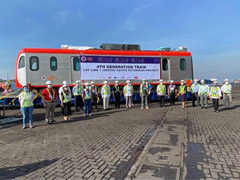First Train Set of the 4th Generation LRVs for LRT-1 arrive in PH
2021.02.02
As the Philippine government opens up transportation gradually to help revive economic activities, first train set from the 120 Light Rail Vehicles (LRVs) supplied by Mitsubishi Corporation with partnership of Construcciones Y Auxiliar de Ferrocarriles of Spain for the Light Rail Transit Line 1, arrived in Manila this week.
The first train set is part of the 120 new rolling stocks funded under the Official Development Assistance (ODA) of the Japan International Cooperation Agency (JICA) with the Department of Transportation (DOTr) for the Capacity Enhancement for Mass Transit Systems in Metro Manila (Line 1 South Extension).
"The arrival of the new trains signals the strong efforts between JICA and the Philippines to improve the quality of life of Filipinos through improved mass transit systems. Japan is also sharing its technology to ensure that the trains are energy-efficient, has low maintenance costs, and can withstand natural disasters," said JICA Senior Representative KAWABUCHI Kiyo.
Each 4-car train set can accommodate about 1,388 passengers, and the newest addition to the existing fleet to serve the growing number of passengers that are expected at approximately 300 million annually by year 2025. JICA also emphasized that aside from easing traffic congestion, enhancing the capacity of LRT-1 will also help mitigate air pollution in Metro Manila brought by rapid urbanization and increase in registered vehicles plying business district routes.
Aside from new trains, the project also includes expansion of the existing depot in Baclaran, and construction of new satellite depot in Zapote, Cavite.
JICA said, enhancing local mass transit system will "help address growing transport demand in the Philippines once the economic recovery becomes in full swing." It can be recalled that a 2018 JICA Follow-Up Survey on Roadmap for Transport Infrastructure Development for the Greater Capital Region reported that without intervention, economic costs of transportation in Metro Manila can reach 5.4 billion pesos a day by 2035. Economic costs refer to the vehicle operating costs and time costs spent by drivers and passengers along Metro Manila's road networks.
Aside from the LRT-1 assistance, JICA is also supporting other key transport infrastructure projects in the Philippines such as the Metro Manila Subway, North-South Commuter Railway (NSCR), Metro Rail Transit Line 3 Rehabilitation, Light Rail Transit (LRT) Line 1 Cavite Extension, and LRT Line 2 East Extension Projects. Despite the pandemic, the JICA-assisted Philippine Railway Institute (PRI) also completed training over 100 railway engineers and operators to further boost the country's railway services.

scroll